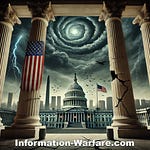The international reaction to recent U.S. political developments, as highlighted by prominent publications like France's Le Monde and Germany's Die Zeit, underscores widespread global concerns over a possible shift in America’s position on the world stage. Le Monde’s headline, “End of the American World,” captures a growing sentiment of disillusionment among foreign observers, who see recent U.S. policies as a significant departure from the nation’s traditional role as a global leader and advocate for democratic values. This response reflects anxieties that these changes may signal the beginning of a new era, one in which the U.S. appears less committed to multilateral alliances and democratic ideals that have been cornerstones of its influence since the end of World War II.
Le Monde’s editorial critiques this emerging direction, portraying it as a break from the longstanding U.S. identity as an “open superpower committed to the world.” For decades, the United States has been seen as a beacon of democracy, promoting governance rooted in multilateralism, human rights, and international cooperation. The recent shift in approach, however, points toward a more insular focus. A move to reassess military support to Ukraine and to pursue peace negotiations that appear more favorable to rival nations is emblematic of this departure, creating a sense of unease among European allies who have historically relied on U.S. support for stability and security.
This perceived shift is about more than just policy; it touches on foundational values. Le Monde’s “nail in the coffin” metaphor, referencing the traditional vision of America as a “shining city on a hill,” suggests that the ideals of America’s global mission—spreading democracy, upholding human rights, and countering authoritarianism—may now be sidelined in favor of a more transactional, “America First” philosophy. Under this new approach, alliances are viewed not as partnerships based on shared values, but as agreements weighed by U.S. national interests and immediate returns.
For Europe, this recalibration of U.S. foreign policy poses direct challenges. European nations, especially those on NATO’s eastern borders, may need to reconsider their defense strategies, potentially accelerating efforts to create a more autonomous European defense policy. This potential realignment signals a shift towards a multipolar world order, where the U.S. is no longer the anchor of Western values and stability. For countries that have long depended on American leadership, this change could foster a more fragmented and uncertain international environment, with authoritarian powers like Russia and China poised to step into any perceived vacuum.
In essence, recent U.S. political changes are being seen as a turning point that could reshape the global order, challenging the democratic institutions and alliances that have helped maintain peace and stability since WWII. For many, it marks the end of an era and the beginning of a world where America’s role is redefined, leaving traditional allies to navigate an uncertain future on their own.










